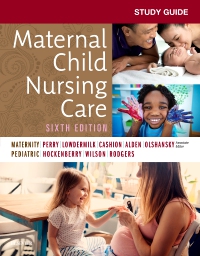
Study Guide for Maternal Child Nursing Care - Elsevier eBook on VitalSource, 6th Edition
Elsevier eBook on VitalSource

Help students master content and apply knowledge from Maternal Child Nursing Care, 6th Edition with this corresponding Study Guide. In addition to reviewing content from the text, it encourages students to think critically and use the text more effectively. This comprehensive workbook is filled with case-based activities, as well as review questions that provide students with plenty of opportunities to assess their knowledge. Updated content throughout corresponds to new features and chapters of the text.
Newer Edition Available
Study Guide for Maternal Child Nursing Care - Elsevier eBook on VitalSource
-
- NEW! Updated content throughout corresponds to new features and chapters of the text
- Thinking Critically case-based activities require students to apply the concepts found in the chapters to solve problems, make decisions concerning care management, and provide responses to patient questions and concerns
- Reviewing Key Concepts and Content questions in various formats give students ample opportunities to assess their knowledge and comprehension of information covered in the text. Activities, including matching, fill-in-the-blank, true/false, short answer, and multiple choice, help students identify the core content of the chapter and test their understanding upon completion of reading the chapter
- Learning Key Terms matching and fill-in-the-blank questions let students test their ability to define all key terms highlighted in the corresponding textbook chapter
- Perforated pages allow instructors to utilize the Study Guide activities for graded assignments
- Answer key at the end of the book includes answers to all questions
-
NEW! Updated content throughout corresponds to new features and chapters of the text
-
PART 1: MATERNITY NURSING
UNIT 1: INTRODUCTION TO MATERNITY NURSING
1. 21st Century Maternity Nursing
2. Community Care: The Family and Culture
UNIT 2: REPRODUCTIVE YEARS
3. Assessment and Health Promotion
4. Reproductive System Concerns
5. Infertility, Contraception, and Abortion
UNIT 3: PREGNANCY
6. Genetics, Conception, and Fetal Development
7. Anatomy and Physiology of Pregnancy
8. Nursing Care of the Family During Pregnancy
9. Maternal and Fetal Nutrition
10. Assessment of High Risk Pregnancy
11. High Risk Perinatal Care: Preexisting Conditions
12. High Risk Perinatal Care: Gestational Conditions
UNIT 4: CHILDBIRTH
13. Labor and Birth Processes
14. Pain Management
15. Fetal Assessment During Labor
16. Nursing Care of the Family During Labor and Birth
17. Labor and Birth Complications
UNIT 5: POSTPARTUM PERIOD
18. Maternal Physiologic Changes
19. Nursing Care of the Family During the Postpartum Period
20. Transition to Parenthood
21. Postpartum Complications
UNIT 6: NEWBORN
22. Physiologic and Behavioral Adaptations of the Newborn
23. Nursing Care of the Newborn and Family
24. Newborn Nutrition and Feeding
25. The High Risk Newborn
PART 2: PEDIATRIC NURSING
UNIT 7: CHILDREN, THEIR FAMILIES, AND THE NURSE
26. 21st Century Pediatric Nursing
27. Family, Social, Cultural, and Religious Influences on Child Health Promotion
28. Developmental and Genetic Influences on Child Health Promotion
UNIT 8 ASSESSMENT OF THE CHILD AND FAMILY
29. Communication, History, and Physical Assessment
30. Pain Assessment and Management in Children
UNIT 9 HEALTH PROMOTION AND SPECIAL HEALTH PROBLEMS
31. The Infant and Family
32. The Toddler and Family
33. The Preschooler and Family
34. The School-Age Child and Family
35. The Adolescent and Family
UNIT 10: SPECIAL NEEDS, ILLNESS, AND HOSPITALIZATION
36. Impact of Chronic Illness, Disability, or End-of-Life Care for the Child and Family
37. Impact of Cognitive or Sensory Impairment on the Child and Family
38. Family-Centered Care of the Child During Illness and Hospitalization
39. Pediatric Variations of Nursing Interventions
UNIT 11: HEALTH PROBLEMS OF CHILDREN
40. Respiratory Dysfunction
41. Gastrointestinal Dysfunction
42. Cardiovascular Dysfunction
43. Hematologic and Immunologic Dysfunction
44. NEW! Cancer
45. Genitourinary Dysfunction
46. Cerebral Dysfunction
47. Endocrine Dysfunction
48. Musculoskeletal or Articular Dysfunction
49. Neuromuscular or Muscular Dysfunction



 as described in our
as described in our 